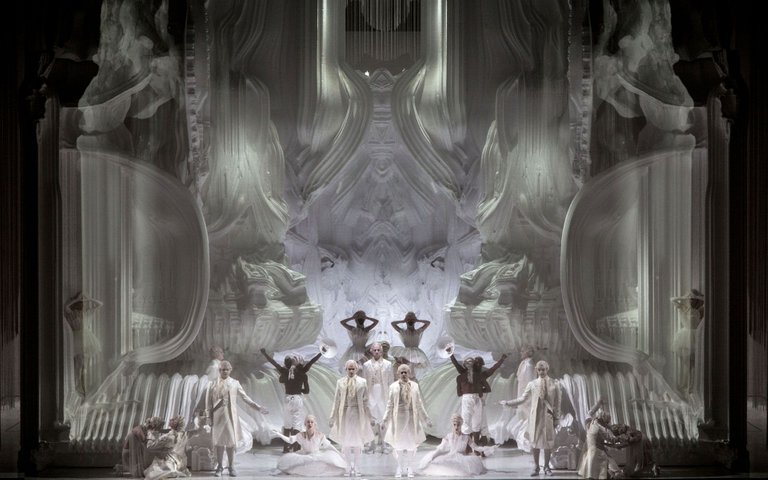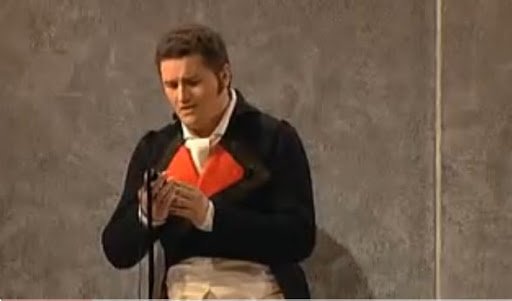Composed very shortly before Mozart's death in 1791, this German Singspiel is one of the most popular opera ever written. Being a Singspiel means that its musical numbers are connected by spoken German dialogs rather than sung speech. This allows the singing-actors more freedom to display their dramatic flares while moving the story along, though the uneven pacing between the sung numbers and the spoken part can take some getting used to for opera newbies (especially when the singers' speaking voice is very different from his/her singing one).
The story concern the philosophical education/enlightenment of Prince Tamino, who opens the opera by fainting at the sight of a giant snake. He is rescued by three veiled ladies who then left to alert their boss, the very high-voiced Queen of the Night, to the presence of this handsome stranger. Tamino wakes up to find Papageno, an amazingly childish and unambitious birdcatcher who falsely takes credit for slaying the snake, and is promptly punished by the three ladies for lying. They and the Queen of the Night inform Tamino that the Queen's beautiful daughter, Pamina, has been kidnapped by the Priest Sarastro and needs rescuing. Armed with the magic flute and bells, Tamino and Papageno stalk off in search of Pamina. They soon realize that they were deceived by the Queen, whose true mission is to steal back the source of her husband's magical power, the '7 Circles of Stars', and so resolve to join Sarastro's Temple of Wisdom instead. The pair are subjected to trials and temptations (including not talking to Pamina, sending the sensitive girl into a suicidal fit of depression). With the help of three little boys, Tamino and Pamina successfully complete all the trials and are deemed worthy of joining the temple, while decidedly less ambitious Papageno finds a fitting mate in Papagena, as the Queen and her minions are defeated (by what, I'm not sure but am too distracted by Mozart's divine music to care).
It is no surprise that there are many things occurring in 'three' in this opera (even the overture drives the number home with its opening three blasted chords from the brass that keep coming back through out the opera) considering that the number '3' is revered by the Freemason, a secret society that Mozart and his librettist, Emmanuel Schikaneder, belonged to. The three major characters of the opera; Tamino, Pamina, and Sarastro (the Queen is only onstage for less than 10 minutes even though her music is the most memorable) also seem to represent the masonic ideals of reason, nature, and wisdom. Much fun can be had in trying to decipher all the Freemason 'insider' subtexts in the opera... if you can keep your mind away from Mozart's catchy music galore or a work for long enough, that is!
Cast:
Prince Tamino ::: Piotr Beczala (tenor)
Papageno ::: Anton Scharinger (baritone)
Queen of the Night ::: Elena Mosuc (soprano)
Pamina ::: Malin Hartelius (soprano)
Sarastro ::: Matti Salminen (bass)
Monostatos ::: Volker Vogel (tenor)
Papagena ::: Julia Neumann (soprano)
1st Lady ::: Martina Jankova (soprano)
2nd Lady ::: Irène Friedli (soprano)
3rd Lady ::: Ursula Ferri (mezzo-soprano)
Franz Welser-Möst/ Orchestra of the Zurich Opera House
Jürg Hämmerli/ Chorus of the Zurich Opera House
Stage Director ::: Jonathan Miller
Considering the supernatural nature of Mozart’s Freemason opera, there really is no such thing as traditional staging of this thing. This rather solemn staging by Jonathan Miller is functional and very unspectacular, which works in that it focuses the attention on the singing-actors rather than the set (which seems to be an elaborated mix of the interior of a library furnished with pyramids and obelisks). I thought he was setting the actions of the story as Tamino’s dream at first, but apparently not, since he never comes back to 'wake up' from it in the end. If you are looking for a 'magical' and children-friendly staging of this opera (birdy looking Papageno and Papagena and the likes), this is not the production for you. It focuses more on the Freemason’s idea of enlightenment and the pursuit of knowledge, I think. You absolutely must know the story/text of the opera before you watch this thing or it won’t make any sense to you (and unlike the more fantasy-world production, there’s nothing to 'Ooh!' and 'Aaah!' to in between the sung numbers).
Piotr Beczala is a Tamino that takes a while to warm to. He is secure vocally and I quite like that his character shows development in the course of the opera. When we see him in the beginning he is a smug Prince who tries to impress a simple stranger (Papageno) with his royal pedigree but faints without a fight when confronted with a giant snake (or perhaps more from the sight of the bored bare-chested lady who dejectedly carries the snake around the stage). Once it dawns on him that he had taken the wrong side at first and would learn more from Sarastro, he becomes humble and (even) more stable.
Malin Hartelius is a good Pamina (though not as impressive as she is as Sophie and Melanto in Zurich Opera’s productions of Der Rosenkavalier and Il ritorno d’Ulisse in patria). Her singing is beyond reproach, and Act II 'Ach! ich fühl's' is devastatingly heart-broken. Hartelius is also an accomplished actress.... though still finds it rough going trying to keep a straight face as Elena Mosuc’s rather weirdly amusing Queen of the Night yaks out in front of her. While I can laugh out loud at how funny Mosuc looks with her facial expression and her way overused finger-wagging during the rage aria ‘Der Hölle Rach’, Hartelius has just about all she can handle trying to suppress her face into something closer to horror (which would be appropriate) rather than bursting into a giggling bout (which would be highly unfortunate for the drama just then). To be fair, Mosuc sings the highly demanding arias and a brief solo in the final quintet well (all the F’s are cleanly hit, but without enough ‘Oomph ’ to make the character’s menace easily heard). It is during the spoken dialog part that she is reduced to always sounding like she is reading a line.
Matti Salminen’s Sarastro, and Anton Scharinger’s Papageno turn in a remarkably fresh performance despite of their having done these roles for years. Salminen’s steady and dark bass and statuesque physique are befitting the benevolent Sarastro, while Scharinger’s acting makes it believable that his character is much younger than he actually looks. He actually consumes quite a lot of food and drink through out the shows but somehow manages to still sing his part very engagingly without regurgitating anything (and I love how his Papageno gets more and more intoxicated with every swig of the wine bottle before his Papagena shows up in her true young self. The dude really downs the whole bottle in the course of his ‘Ein Mädchen oder Weibchen’). All the minor roles are well sung and acted.
All in all, it is a very good musical performance of Mozart's most popular opera, and one that might take a while to warm to dramatically. I recommend this one for those who are familiar with and enjoy Jonathan Miller's conceptual style of staging, and for fans of Beczala, Mosuc, and Hartelius.




Congratulations @devoran! You have completed the following achievement on the Hive blockchain and have been rewarded with new badge(s) :
You can view your badges on your board and compare yourself to others in the Ranking
If you no longer want to receive notifications, reply to this comment with the word
STOP